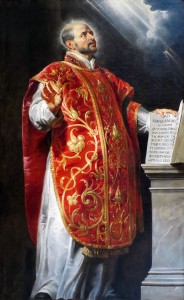We’ve all been told that the regular reading of Scripture is essential for growing in faith learning about God. But another way of learning about God – a way that too frequently is undervalued by evangelicals – is to study the works of the great theologians and philosophers. Why are such studies important? Consider the life of Inigo Lopez de Loyola. Born in 1491 as the 13th child of a minor noble family in northern Spain, he grew up to be a military hothead. In May 1521 his native city of Pamplona was attacked by troops from neighboring Navarre. The city leaders wanted to surrender, but Inigo insisted that they fight on for the sake of their honor. Inigo led the city’s forces in the ensuing battle, but he was hit by a cannonball and suffered a broken leg. Captured, he was transferred to Loyola and there was confined to a bed for many months. He requested books of chivalry and romance. Instead, he was given The Life of Christ and Lives of the Saints.
St. Ignatius of Loyola, 1491-1556, by Peter Paul Rubens
Inigo’s injuries had destroyed his dream of battlefield heroism. He faced a forced period of leisure and reflection. But amid his life’s collapse, he found opportunity. For the first time he wondered about his life’s purpose and trajectory. Over the weeks of convalescence he imagined himself inside of the stories he read. His soul was moved by the peace and love of the gospel message. Finally, recovering from his injuries, in 1538 he changed his name to Ignatius and became a priest. In 1540 he and several companions took a special vow of spiritual fidelity when their order of the Society of Jesus was approved by Pope Paul III. By 1556, when St. Ignatius died, the Society was sending missionaries around the globe. In the centuries following Loyola’s life, the Jesuits placed a special emphasis on schools, spiritual education, the humanities, and the sciences. They were fearless messengers in dark and dangerous places in China, Japan, Latin America, and Africa. Their teaching was always that we ought to prize wonder and not skepticism about theological and philosophical issues.
Although I am a Protestant, I derive great inspiration from the life of Loyola. Here is a man who dramatically altered his trajectory halfway through, and who stood the rest of his days for a gospel of peace. Instead of wasting his life, Loyola stepped back from the world and acquired a superior vision of what he could be and accomplish. His efforts have inspired countless educators and gospel missionaries over the centuries. We are not all called to be Loyolas or even to devote our lives to professional ministry. But what Loyola demonstrates is that it is possible for our theological reflections, undertaken apart from the day-to-day world, to offer us a deeper vision of our spiritual purpose. Like Loyola, we too can find insights in the thinkers of the theological tradition. To study the tradition is to encounter some of the brightest minds in history. To stand on the shoulders of Athanasius, Augustine, Aquinas, Luther, or Melanchthon, is to put ourselves in a position to learn many more things about God than we otherwise could do on our own. Let us take inspiration from these great theologians and press on to increase our knowledge of God and the things of God each day.





